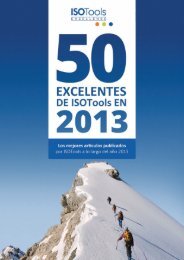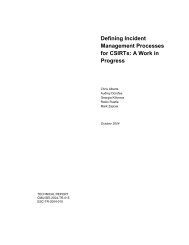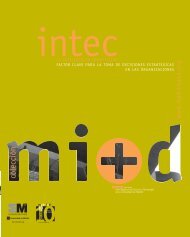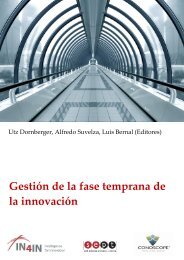The Global Innovation Index 2012
The Global Innovation Index 2012
The Global Innovation Index 2012
Create successful ePaper yourself
Turn your PDF publications into a flip-book with our unique Google optimized e-Paper software.
egularly update their pages and share<br />
content. While large enterprises and national<br />
economies have reaped major benefits from<br />
this technological revolution, individual<br />
consumers and small, upstart entrepreneurs<br />
have been some of the greatest beneficiaries<br />
from the Internet’s empowering influence.<br />
If Internet were a sector, it would have a<br />
greater weight in GDP than agriculture or<br />
utilities.15<br />
Importantly, the McKinsey<br />
report notes that future innovation<br />
and change brought about by the<br />
Internet will be significant—for<br />
everyone:<br />
. . . we are still in the early stages of the<br />
transformations the Internet will unleash and<br />
the opportunities it will foster. Many more<br />
technological innovations and enabling<br />
capabilities . . . are likely to emerge, while the<br />
ability to connect many more people and<br />
things and engage them more deeply will<br />
continue to expand exponentially.16<br />
Building communities and catalysing<br />
social innovation and change<br />
Just as the Internet is facilitating<br />
linkages among businesses,<br />
entrepreneurs, and other entities<br />
integral to today’s economies, it is<br />
also facilitating and encouraging<br />
linkages among a diversity of social<br />
entities, communities, academic<br />
organizations, and others, delivering<br />
unprecedented levels of social and<br />
activism-related collaboration and<br />
interaction around the globe. As the<br />
fathers of the Internet noted in their<br />
Internet history: ‘<strong>The</strong> Internet is as<br />
much a collection of communities as<br />
a collection of technologies. . . . ‘17<br />
<strong>The</strong> like-minded enthusiasts—<br />
academic, scientific, and engineering<br />
experts—who built and<br />
managed the Internet in its early<br />
days not only worked to develop<br />
technical standards and establish the<br />
basic functionality of the Internet,<br />
but they also helped shape the initial<br />
spirit of the Internet—one based on<br />
the principles of sharing resources,<br />
of open access, and of open standards.<br />
<strong>The</strong>se tenets quickly evolved<br />
into a credo that embraced both<br />
simple, open structures reflecting<br />
principles of freedom of expression<br />
and information, and consultation<br />
processes with a broad community<br />
of stakeholders.<br />
This openness encouraged evermore<br />
diverse communities to use<br />
and build on the Internet as a platform<br />
for communication, creativity,<br />
and collaboration. <strong>The</strong> Internet<br />
user’s horizon is almost limitless: a<br />
citizen with an Internet connection<br />
becomes a global citizen, instantly<br />
connected to individuals and communities<br />
and instantly aware of<br />
issues, happenings, and change at<br />
local, national, and international<br />
levels. Issues or interests that might<br />
once have been the purview of the<br />
few are now within the grasp of the<br />
many.<br />
In 1992, when Vint Cerf and<br />
Bob Kahn announced the launch of<br />
the Internet Society, they remarked<br />
that ‘a global renaissance of scientific<br />
and technical cooperation is<br />
at hand’. While that statement was<br />
true then, and remains true today,<br />
the announcement was incomplete.<br />
What was not said—what was perhaps<br />
unforeseen—was the degree<br />
to which the Internet would bring<br />
about unprecedented linkages and<br />
collaboration among individuals<br />
and communities across all sectors<br />
of society and the degree to which<br />
such collaborative efforts could and<br />
would address global challenges.<br />
<strong>The</strong>re are myriad examples of<br />
community-building and knowledge-sharing<br />
that address challenging<br />
issues around the globe. One<br />
such example, which brings together<br />
a diverse range of global stakeholders,<br />
is the Research4Life program,<br />
a public-private partnership of<br />
the World Health Organization<br />
(WHO), the Food and Agriculture<br />
Organization of the United<br />
Nations (FAO), the United Nations<br />
Environment Programme (UNEP),<br />
the World Intellectual Property<br />
Organization (WIPO), Cornell and<br />
Yale Universities, the International<br />
Association of Scientific, Technical<br />
& Medical Publishers, and Microsoft.<br />
<strong>The</strong> partnership’s innovative goal is<br />
to make available online scientific<br />
knowledge to those countries that<br />
typically would have very limited<br />
access to it:<br />
<strong>The</strong> concept of Research4Life is simple:<br />
research in health, agriculture and the<br />
environment is better informed when it is<br />
based on the most recent, high quality and<br />
relevant scientific knowledge. Research4Life<br />
applies this, delivering knowledge to the<br />
world’s poorest countries. Research4Life is<br />
empowering universities, colleges, research<br />
institutes and government ministries as well<br />
as non-governmental agencies and hospitals,<br />
with access to scientific knowledge that was<br />
never before imagined.18<br />
<strong>The</strong> Internet is also being used<br />
to strengthen the well-being of<br />
existing communities in developing<br />
countries. <strong>The</strong> Millennium Villages<br />
project, for example, is enhancing<br />
the economic viability of communities<br />
in the developing world. Led by<br />
Jeffrey Sachs and the Earth Institute<br />
at Columbia University, the program<br />
is also designed to meet the UN’s<br />
Millennium Development Goals<br />
(MDGs). Although technology and<br />
Internet access are but a part of the<br />
development equation, Sachs notes<br />
how they provide some of the key<br />
building blocks—innovation linkages—for<br />
meeting the MDGs and<br />
particularly how important they are<br />
to spurring innovative and sustainable<br />
multi-stakeholder approaches to<br />
development:<br />
Information technologies such as mobile<br />
phones, Internet connections in schools and<br />
159<br />
THE GLOBAL INNOVATION INDEX <strong>2012</strong> 10: <strong>The</strong> Internet






